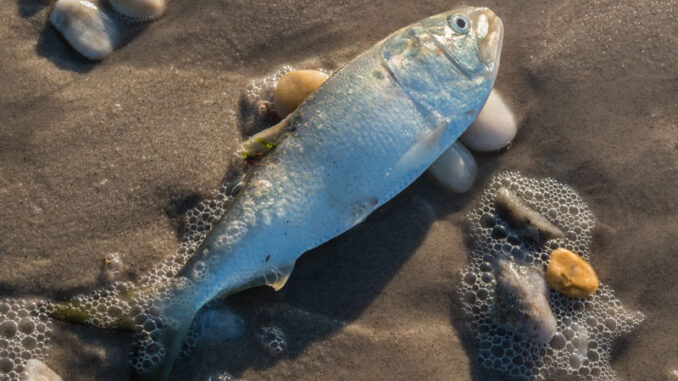
Once again, Louisiana sportsmen, conservationists and those interested in protecting Louisiana’s fragile shorelines have to sit and wait.
Dozens of arguments, hours of testimony, overwhelming public comments and piles of factual information indicate a desperate need for more strict regulations on the pogie industry, but the Louisiana Wildlife and Fisheries Commission has once again stalled, failing to adopt it’s own Notice of Intent.
In October, 2023 the Commission took action on extending the limits for pogie boat fishing by passing an NOI to one mile offshore, instead of a mere 440 yards (1/4 mile).
But at its February 1, 2024 meeting, the LWFC voted to postpone a decision to adopt the rules for the menhaden fishery, even after Louisiana Wildlife and Fisheries representatives reported that of 591 public comments received on the NOI, 404 were explicitly in favor of the proposed regulations and 31 were against.
Instead of voting, though, the Commission asked key stakeholders to meet prior to the next commission meeting on March 7, and try to find a solution that is agreeable to all parties. They pointed out this has been tried numerous times before with no success. And no one stipulated exactly who those key stake holders are, but two are the Coastal Conservation Association (CCA) and the Pogie industry itself, both represented in force at the meeting.
Visibly frustrated
Few public comments were given on getting the groups back together to find a solution, but one speaker at the Feb. 1 meeting was visibly frustrated with that approach and the inability of Commission members to pass the NOI.
“That’s not their job; that’s your job,” Erin Bennett of Baton Rouge, told the commission. “Your job is to regulate both the commercial and the recreational fishing in the state.”
Turning her comments to pogie industry representatives, she said, “It seems obvious the problem is that you are fishing too shallow.”
At a time recreational fishermen are being told they must reduce catches of redfish and speckled trout, apparently the wasteful by-catch of thousands of pounds of reds and specks left in the wake of shallow operating pogey boats are discounted. A third party by-catch study to further investigate the amount of waste caused by pogey boats is underway, but is months away from completion.
“They asked the major stakeholders if we could work with the department to discuss some options, and we will try to do that,” said David Cresson, CEO of the CCA. “We agreed to do that. It puts off a decision until next month, but I am extremely confident there will be a final vote in March and we will do the right thing.”
CCA was also represented by its President, Marc Mouton, and it’s Chairman, Charlie Caplinger. Mouton urged the Commission not to continue “kicking the can down the road” and to take action. Caplinger also urged passing of the resolution and reminded Commission members that not only was a majority of the public input in favor of tougher restrictions, a letter supporting the actions by 82 state legislators was presented to the Commission in October. They also said they were hopeful that with a new administration in charge, protecting the state’s outdoor resources would be a priority.
It’s about conservation
While some giving testimony tried to simplify the issue into simply a “user-group conflict” between recreational fisherman vs. commercial fishermen, it goes much deeper than that.
“There is ample reason and evidence that you are all aware of why this NOI is a good idea,” said Chris Macaluso, Director of the Center for Marine Fisheries at the Theodore Roosevelt Conservation Partnership. “This is about conservation.”
Others representing large groups of Louisiana conservationists also testified once again on the issue. They included the Louisiana Charter Boat Captains Association and the Louisiana Wildlife Federation. District 54 State Representative Joe Orgeron also testified and pointed out that a huge majority of public comments favored passing the NOI.
Francois Kuttel, a pogie industry fleet manager, said there would be loss of jobs associated with tighter regulations. He also led a group of pogie employees, including a process plant manager, numerous boat captains and pogie fishermen asking the Commission to vote down the NOI, saying it would make their jobs harder.
Louisiana remains alone on the Gulf of Mexico in allowing slack regulation and monitoring of the pogie industry along its fragile shoreline.
Commissioners attending the meeting included Chairman Brandon DeCuir, Andy Brister, Andrew Blanchard, Gene Reynolds, Kevin Sagrera and Wendell Luneau, Jr.
The depth of the problem gained firm traction with public opinion last year when an entire Omega Protein net containing roughly 500,000 pounds of menhaden (pogies) was abandoned, causing an enormous fish kill near Holly Beach. About the same time, a Daybrook Fisheries vessel was cited for harvesting almost 100,000 pounds of pogies in restricted waters.
Those were just two of dozens of cases which gave the industry a black eye last year alone, some of which initially went unreported. Omega and Daybrook are foreign-owned companies running operations in the state. Many of the pogies caught in Louisiana waters are also taken to a plant in Mississippi.
Industry spokesmen have said for years that spills are not common, but a review of state records has shown that in the past four years, nearly nine million pounds of fish have been spilled due to equipment and operation failures by pogie boats.
While representatives of sportsman’s groups said they will once again try to work with the pogie industry, it is important that members of their groups and the general public who want to protect Louisiana’s valuable coastal resources must continue letting their opinions be heard by state legislators and members of the Commission.